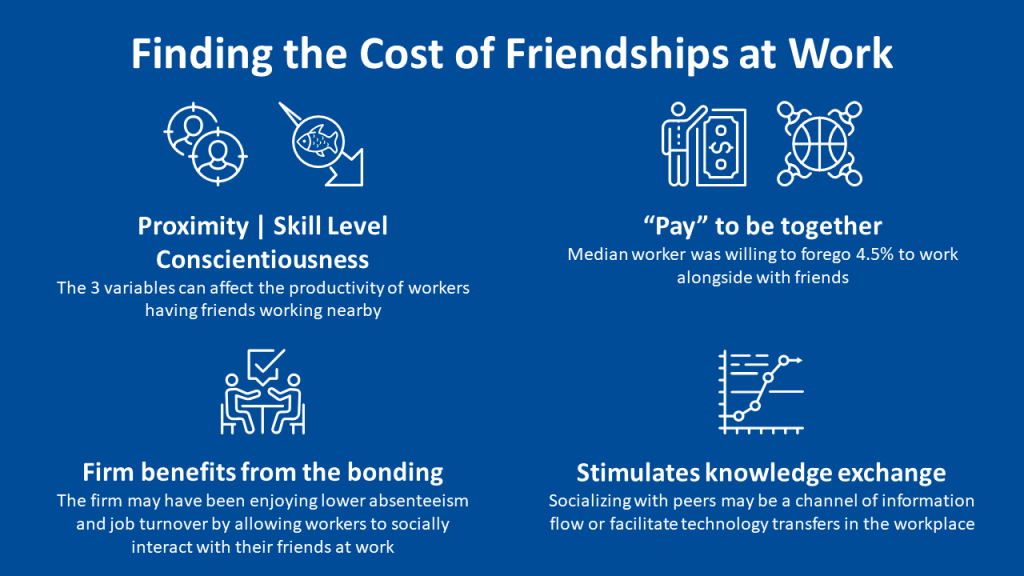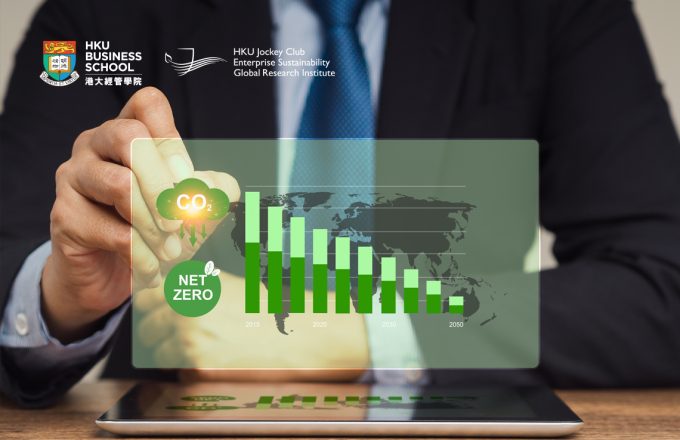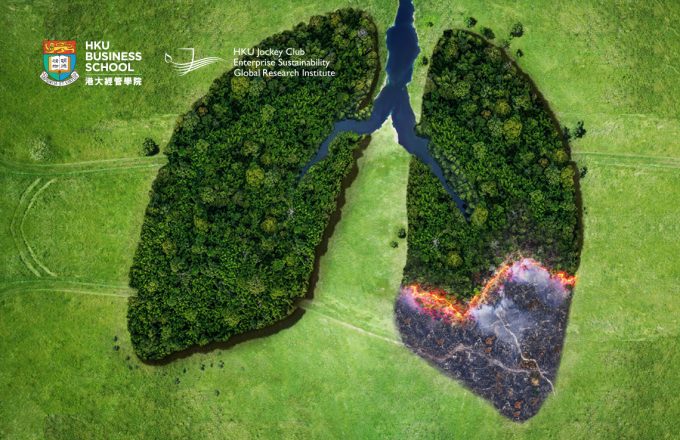Finding the Cost of Friendships at Work

Dr Sangwoon Park’s study takes a scientific look at what makes friendships at work tick and how these friendships affect productivity in the workplace. His findings reveal that worker productivity declines when friends socialize at work, but that, surprisingly, people are also willing to “pay” almost 5% of their wages to work near a friend – suggesting that friends who work together get more out of their jobs than just money.
Having friends at work – delightful or distracting?
Everyone who has ever had a job knows that it can be fun to work with your friends. Everyone also knows that, sometimes, for better or for worse, the “fun” part of this equation gets a higher priority than the “work” part. A little while ago, Dr Sangyoon Park, an Assistant Professor of Economics at HKU Business School, decided to take a more scientific look at this situation through a field experiment.
The location? A seafood processing plant in Vietnam. Central to the experiment was a question that has long been asked by friends, colleagues, business managers, executives…just about everyone: “Does working alongside friends affect productivity?”
Dr Park specializes in research that applies peer effects, gender, and technology adoption to concepts involving development, labour, and personal economics. Each of these subjects came into play in this fascinating experiment.
The design of the experiment
The processing plant at the centre of the story manufactures seafood products for export to the US. One task performed by plant workers is filleting, which is done on rectangular tables at which between four and six workers stand as they do their jobs. The workers process fish, then place their work on individual trays that are weighed and then inspected and passed on to the next stage of production or sent back for corrective filleting. The workers are paid via a two-part wage system comprised of their attendance at work and their overall output. This involves a base wage which they receive for showing up to work, and a performance wage which varies by the weight of the fish they process. Before the experiment, the workers would choose their own positions at the tables at the start of their workday, standing next to whomever they wanted.
After observing this relatively stable environment for six weeks, Dr Park then threw a wrench into it – randomization. For a period of five months, instead of choosing their own positions, workers were assigned random positions at tables in the processing room. In a practical sense, this meant that before the experiment, they could choose who they worked next to or nearby, but during it, they could not.
Information gathered through a baseline survey prior to the randomization allowed Dr Park to determine the participants’ socioeconomic status, their personality type (via a “Big Five Inventory” questionnaire which measures five dimensions of a person’s personality), their processing skill, and their social ties within the workplace. Most of the participating workers reported having between three and five friends at the plant, with whom they would engage in shared activities like giving personal advice, working at the same table, and talking during break times.
So far, so straightforward – right?
Now it gets complicated.
Measuring friendship and skill – a convoluted task
To properly analyse how knotty concepts like “friendship” and “level of effort” affect productivity, Dr Park needed to develop a conceptual framework. This involved a significant amount of complex mathematics and statistics which measured whether working with friends motivates a worker, making it easier for them to get their job done; or whether it makes it harder due to “idle chats or the spread of negative work behaviour between friends.”
Adding to the complexity was the sheer diversity of human behavioural responses. Basically, whether people work harder or less hard depends not only on the presence of friends, but also on their personality and skill level. A similar study of agricultural workers found that some people might innately work slower and influence their peers to slow down, while others might work faster and influence people to speed up. On top of this, some people might feel peer pressure to keep up, others may be driven by a desire to avoid inequality, and still others may be extroverts for whom friendly conversation is a catalyst for productivity. And then there are the conscientious people, with strong self-discipline and self-control, who are able to cope well with distractions and “power through” their tasks despite whatever is happening around them.
Dr Park brought all of these intricacies together in a neat empirical framework based on several variables: proximity – whether a worker was in high, medium or low proximity to a friend; productivity, measured in kilograms of fish processed per hour; production skills – whether a worker had higher or lower processing skills; and personality skills, specifically whether a worker was conscientious or not.
Putting a literal price on friendship

We will not do a deep dive into the mathematics of Dr Park’s framework and the subsequent statistical analysis. Suffice to say that he put a great deal of effort into ensuring that the worker placement assignments were truly randomized and that the equations used to produce the results were as robust as possible. After all the data were collected, measured and analysed, the results were truly fascinating.
When working alongside their friends, the average worker was 6 percent less productive. The productivity of workers filleting fish next to a friend with a higher ability declined by 4.6 percent, while those working next to a friend with a lower ability saw a decline of 7.3 percent. This raised an interesting secondary hypothesis – were workers actually willing to pay to work with their friends?
The answer was “yes” – for most people anyway. Further analysis revealed that the median worker in this experiment was willing to forego 4.5 percent of their wages to fillet alongside their friends. This did not apply to everyone – those with more work experience and those who were married did not display this willingness.
Still, these results may have far-reaching repercussions for workplaces around the world.
Implications for the world of work
As Dr Park elegantly summarizes, workers are willing to pay to be near a friend because “they derive nonwage benefits as a result.” This echoes a long-range study on the impact of co-workers on health conducted at Tel Aviv University between 1988 and 2008. As reported in the Wall Street Journal, the study “discovered that the support of their co-workers was most closely linked to good health and that less-kind teammates were associated with a higher risk of dying. They concluded that middle-age workers with little or no ‘peer social support’ in the workplace were 2.4 times more likely to die during the study.”
Benefits other than ‘not dying’ are also outlined in Dr Park’s conclusions, including how socializing with peers may be a channel of information flows or facilitate technology transfers in the workplace. Interviews conducted with the fish processors themselves also suggested that many considered working with a friend to be a perk of the job, i.e. they liked going to work because their friends were there. Dr Park hypothesizes that “this firm may have been enjoying lower levels of worker absences and job turnovers prior to this study by allowing workers to socially interact with their friends at work.”
In the final analysis, is it better to work with our friends? Or should we just avoid socializing and focus on the tasks at hand? The answer is, as usual, “somewhere in the middle.” One analyst advocates that, “instead of striving for friendships at work, it’s better to stay friendly with co-workers. Stick with kind and professional relationships – you can grab coffee or lunch, but not necessarily invite them home for a barbecue.” Maybe so.
For business owners and managers, it can be important to cultivate a sense of camaraderie and team spirit in the workplace. If your staff look forward to coming to work and have a positive attitude – your life will be much easier; but equally, you don’t want your staff goofing off and productivity suffering as a result. For staff, if you’re enjoying your job and having fun at work with your mates – great! But are the good times really worth 5 percent of your pay?
It is a difficult balance, but one which everyone in every workplace should strive to find.
About the Research
References
Amodio, Francesco, and Miguel A. Martinez-Carrasco. (2018). Input Allocation, Workforce Management and Productivity Spillovers: Evidence from Personnel Data. Unpublished.
Bandiera, Oriana, Iwan Barankay, and Imran Rasul. (2010). Social Incentives in the Workplace. Review of Economic Studies 77(2): 417–58.
Bandiera, Oriana, Iwan Barankay, and Imran Rasul. (2013). Team Incentives: Evidence from a Firm Level Experiment. Journal of the European Economic Association 11(5): 1079–1114.
Cowgill, Bo, Justin Wolfers, and Eric Zitzewitz. (2009). Using Prediction Markets to Track Information Flows: Evidence from Google. Unpublished.
Lehrer, J. (2011, August 20). ‘Your Co-Workers Might Be Killing You’. Wall Street Journal. https://www.wsj.com/articles/SB10001424053111903392904576512233116576352
Schawbel, D. (2018, November 13). ‘Why work friendships are critical for long-term happiness’. CNBC. https://www.cnbc.com/2018/11/13/why-work-friendships-are-critical-for-long-term-happiness.html
Vasel, K. (2018, November 6). ‘The argument against having close friends at work’. CNN. https://www.cnn.com/2018/11/06/success/no-friends-at-work/index.html







